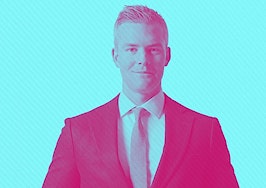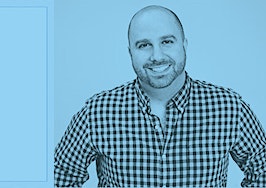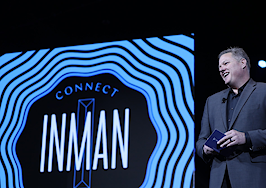Looking for more team-related content? Sign up for our weekly newsletter here.
Real estate teams have been growing in popularity and for good reason. A team offers so much support, infrastructure and lead generation. Being on a team frees up capital because agents often pay little or nothing in operating costs, and it frees up time because agents have a full staff to support them so that they can focus on making deals happen.
Teams have their drawbacks too though. Commissions are split among more people, and often the work of building a business falls under the team’s name rather than the agent’s. On a long-term basis, agents’ names need to be branded. Every day that they aren’t is a day lost in terms of building a lasting business and nurturing leads.
Because of these cons, strong agents can eventually feel stuck or even afraid that they’re going backward on a team. All of these considerations were at play in my decisions over the years to build a uniquely hybrid business that focuses on branding and building the agent, as well as the team.
From agent to team
I started as a single agent with a brokerage. My business growth pushed me to build a large team organically. Eventually, we found ourselves with a team of 35 people.
We ended up systemizing everything we did — bringing in our own in-house photographer, in-house photojournalist, in-house IT, three in-house client concierges, a boat load of lead generation — and paying for all the marketing of our agents.
Our training was top-notch, and our agents grew from great support and empowerment to strong agents who could handle things on their own.
Once we became a team of 35, problems started. Agents were feeling stunted, and rightfully so. They wanted their own identity and their own name to be the center of the listing we were promoting.
Other agents and recruiters in the field started to question our agents, which in turn made them question themselves.
From team to brokerage
So we made a dramatic change. We changed the name from JeffRealty to Echo Fine Properties and became our own brokerage.
The Echo name described what we did better than a name based on me.
The name described us the same way a dolphin pod works together and uses advanced echo location to communicate together and locate food (or for us homes.) We operated as a friendly and extremely innovative team.
Next, we broke away from the brokerage we were with, and established our own brokerage. We put the listings in agents’ names and started to promote them and the Echo name together.
We kept the same team model intact. We still do everything that a team does. We pay for all the marketing and leads and take everything off an agent’s back so they can be productive and concentrate on selling. It’s been a win-win, and we get the best of both worlds.
10 lessons learned along the way
In creating this hybrid team-brokerage, we learned a lot along the way. Below are my top 10 takeaways from our journey.
1. Know what you want
If you’re going to make big moves, you better know what you want. Happy being the rainmaker? Not interested in controlling the traffic of job flow? Don’t want to risk hefty expenditure pressure? Not good at delegating or managing? Then having a large team or a brokerage team is probably not for you.
It took me two years to decide to expand. Once you expand, your ability to be the rainmaker for your business will suffer, so be prepared.
2. Don’t make it about you
In moving from a team to team-brokerage, I decided to change our name from JeffRealty (all about me) to Echo Fine Properties. I took all the listings out of my name, gave listings away, trained agents on all aspects of the business and promoted all our agents individually.
It was the best move for an overall happier team where everyone feels like they’re getting back what they put in.
3. Be consistent with your brand
For a team-brokerage to work best, you must control of the brand. It’s a major advantage because you can have quality control and faster innovation when the company is paying for it.
Don’t let agents bastardize the brand, photos or individual logos. Keep everything first-class and on brand. If Mercedes Benz wouldn’t put a purple logo on its vehicle, then you shouldn’t either.
4. Know your budget
Budgeting is key. You must stay disciplined, which is hard for me because I love to create and experiment. I leave room in my budget for some product development.
3. Job share
It’s all about layering. If you want to add something, job share. I wanted to bring in our own in-house photographer. We hired one who could do both photography and social media. We went through two people and then maybe 150 resumes before we found the right one.
Once we got large enough and had another layer of income, we then had enough to handle where the photographer could just do photography, and then we divided up the social media separately.
4. Hire positive energy doers with discipline
I only hire people who I feel have natural empathy for others and have a get-it-done attitude. I’ll pass on skill set anytime. Work shouldn’t be made more difficult by a team member, and one person can spoil collaboration.
5. Host sales meetings that matter
You have to stay plugged in to your team. Set aside a day, and offer 15-minute meetings once a week to stay in touch. I like to block out Wednesdays for this.
We do a real-word collaborative meeting once a week. Forget vendors, and focus on true hard-core real estate subjects. That’s not to say it can’t be fun. You can absolutely keep interesting by having a “Foodie Friday” or a “Taco Tuesday.”
6. Role-play
We teach by doing lot of role-playing. Have agents listen in to a cold call and then practice for themselves.
Role-play in everything you do from crafting listing presentations to networking to making BombBomb videos.
7. Create goals
You must set goals and create timelines to accomplish those goals. If something isn’t happening, then figure out why.
Is it because someone is fearful? Is it that they don’t know how? Is it they simply don’t want to do it? Whatever it is, once you understand the underlying reasons, then figure out solution around it. It’s the No. 1 most important thing we constantly work on.
8. Have fun
We laugh a lot. You spend so much time at the office — it’s good to have fun. At our Christmas party each year, we play bloopers of ourselves that our in-house photojournalist takes. It’s hilarious.
Figure out your team’s brand of fun, and protect your culture.
9. Communicate your product advantage to the public
For us we have our Home ECHOnomics Guarantee. We actually put 57 promises in writing to ensure that everything that is supposed to happen on a listing, happens.
No one can match it because we have the infrastructure and built in expenditures to do so. We are about ready to launch a campaign in every media we do to the end consumer to get this point across.
Once you have a product advantage, shout it from the rooftops. Make sure consumers in your market know everything about it.
10. Don’t stop innovating
Innovation and cutting-edge technology are in our blood. They keep us ahead of the curve, and it’s fun to be there. If agents are resistant, then figure out why. Break it down. You can teach old dogs new tricks.
Jeff Lichtenstein is the President/Broker of Echo Fine Properties. Connect with him on Facebook or LinkedIn.













